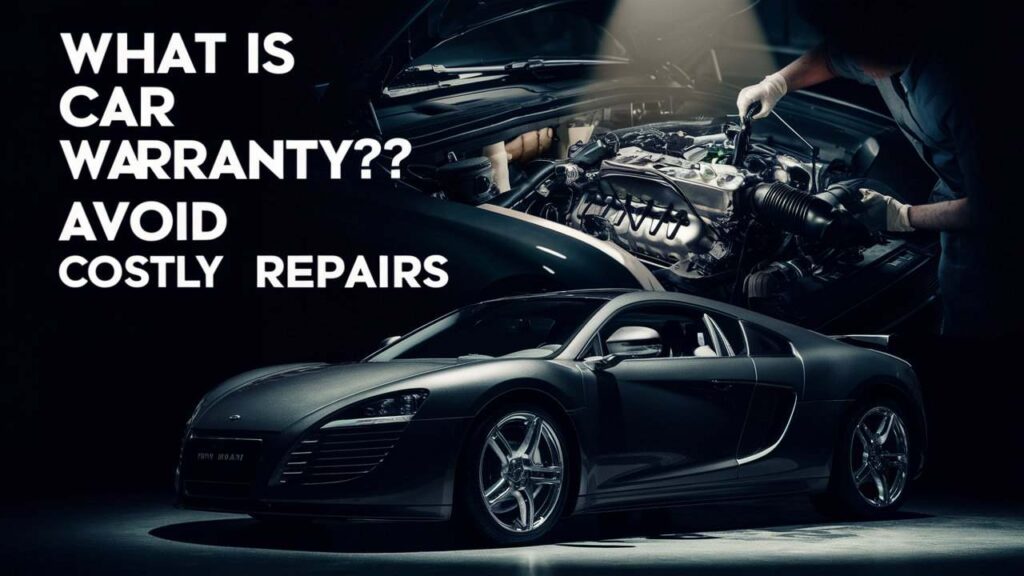Introduction
In the labyrinthine world of automobile ownership, few topics generate as much confusion and curiosity as car warranties. They are, after all, the silent guardians of your vehicle’s health, poised to step in when the unexpected occurs. Understanding the intricacies of a car warranty can mean the difference between a minor inconvenience and a financial headache. This article delves into the nuts and bolts of car warranties, providing you with the knowledge to avoid costly repairs and safeguard your investment.

The Basics of a Car Warranty
Definition and Purpose of a Car Warranty
A car warranty is essentially a promise made by the manufacturer or a third-party provider, assuring the vehicle owner that the car will be repaired or replaced if specific defects or issues arise within a defined period. This contractual obligation is not just a courtesy; it is a strategic shield against the potential avalanche of repair costs that could befall a vehicle owner.
Why Every Car Owner Should Know About Warranties
Every car owner, from the novice driver to the seasoned road warrior, should be well-versed in the nuances of car warranties. These documents are not mere formalities; they are pivotal to maintaining the financial stability of your automotive life. Without a firm grasp of your warranty’s terms and conditions, you might find yourself footing the bill for repairs that could have been covered, thus underlining the critical importance of this knowledge.

Types of Car Warranties
Manufacturer’s Warranty: What It Covers and Why It’s Important
The manufacturer’s warranty is the cornerstone of car warranties. Typically included with the purchase of a new vehicle, it covers repairs due to factory defects or faulty components for a specified period or mileage. This warranty is a testament to the manufacturer’s confidence in their product, offering you peace of mind during the early years of vehicle ownership. Understanding the scope and limitations of this warranty can help you navigate the early stages of your car’s life without undue stress.
Extended Warranty: Is It Worth the Investment?
An extended warranty, also known as a service contract, kicks in after the manufacturer’s warranty expires. It’s a form of insurance that extends your protection, but is it worth the cost? The answer depends on your risk tolerance, the reliability of your vehicle, and how long you plan to keep it. For some, the extended warranty offers a safety net that justifies its price, while for others, it may be an unnecessary expense.

Powertrain Warranty: Protecting Your Vehicle’s Core Components
The powertrain warranty is a more focused type of coverage, specifically designed to protect the most critical and expensive components of your vehicle the engine, transmission, and drivetrain. These parts are the heart and soul of your car, and repairs can be exorbitantly priced. A powertrain warranty ensures that these essential elements are safeguarded against defects, potentially saving you thousands of dollars.
Bumper-to-Bumper Warranty: What’s Included and What’s Not
A bumper-to-bumper warranty, often referred to as a comprehensive warranty, is one of the most inclusive types of warranties available. It covers almost every part of the vehicle between the front and rear bumpers, except for wear-and-tear items like tires and brake pads. While it offers broad protection, it’s crucial to read the fine print, as certain exclusions can leave you exposed to unexpected costs.
Corrosion Warranty: Shielding Against Rust and Decay
Corrosion warranties specifically protect against rust and other forms of body decay, a critical consideration for those living in harsh climates or coastal areas. Rust can silently eat away at your vehicle, leading to serious structural issues. This warranty offers long-term protection, ensuring your car remains not only functional but also aesthetically pleasing for years to come.

How a Car Warranty Works
The Process of Making a Warranty Claim
Filing a warranty claim is a process that requires diligence and attention to detail. When a covered issue arises, the first step is to contact your dealership or warranty provider. Documentation is key maintain records of all maintenance and repairs. The process usually involves an inspection to verify that the issue is indeed covered under the warranty. Understanding this process beforehand can expedite repairs and reduce frustration.
Common Misconceptions About Car Warranties
Car warranties are often misunderstood, leading to false assumptions and unmet expectations. Some believe warranties cover all repairs, which is far from true. Others assume that using non-dealer services voids their warranty, a myth that persists despite laws protecting consumers. Dispelling these misconceptions can help you make better decisions and avoid costly mistakes.
Understanding Deductibles and Their Impact on Repairs
A deductible is the amount you pay out of pocket before the warranty covers the rest. It’s a common feature in extended warranties and can vary significantly. A lower deductible might mean higher upfront costs, while a higher deductible could lead to a lower warranty price but more out-of-pocket expenses when repairs are needed. Balancing this trade-off is essential to maximize the value of your warranty.

What is Covered by a Car Warranty?
Coverage for Mechanical Failures and Defects
At its core, a car warranty is designed to cover mechanical failures and defects that occur due to faulty manufacturing. This includes issues like engine malfunctions, transmission failures, and electrical system breakdowns. However, coverage can vary widely depending on the type of warranty and the provider, so it’s vital to understand what is and isn’t covered.
What Parts and Systems Are Typically Included
Typical coverage under most car warranties includes the engine, transmission, air conditioning, electrical components, and safety systems like airbags. Some warranties might also cover the audio system, navigation, and other tech features. Knowing exactly what parts and systems are included can help you avoid unpleasant surprises when something goes wrong.
Exclusions: What a Car Warranty Won’t Cover
Warranties are not all-encompassing. Common exclusions include routine maintenance, wear-and-tear items like brake pads and tires, cosmetic damages, and damages resulting from accidents or misuse. Understanding these exclusions is crucial, as it helps set realistic expectations and prepares you to handle out-of-pocket expenses when necessary.
The Benefits of Having a Car Warranty
Financial Protection: Avoiding Unexpected Repair Costs
One of the most significant advantages of a car warranty is the financial protection it offers. Without a warranty, a sudden mechanical failure could lead to repair bills running into thousands of dollars. A car warranty acts as a buffer, absorbing these unexpected costs and allowing you to manage your finances with greater predictability.
Peace of Mind: Driving Without Worry
Knowing that your car is covered by a warranty allows you to drive with peace of mind. You’re not constantly worried about what might go wrong next or how you’ll afford repairs. This sense of security can enhance your driving experience, making it more enjoyable and less stressful.
Enhancing the Resale Value of Your Vehicle
A car warranty can also boost the resale value of your vehicle. Buyers are often willing to pay more for a car that comes with an active warranty, as it reduces their financial risk. If your warranty is transferable, it becomes an even more attractive selling point, potentially speeding up the sale and fetching a higher price.

Common Pitfalls to Avoid with Car Warranties
Reading the Fine Print: Why It’s Crucial
The fine print of a car warranty is where the devil lies in the details. Many car owners fall into the trap of assuming their warranty covers more than it actually does, only to be blindsided when a claim is denied. Taking the time to read and understand the fine print can prevent such disappointments and ensure you know exactly what you’re signing up for.
The Risks of Not Following Maintenance Guidelines
Warranties often come with maintenance requirements that must be adhered to strictly. Failing to follow these guidelines can void your warranty, leaving you unprotected. Regular oil changes, tire rotations, and other routine services are not just for your car’s health they are also critical to maintaining your warranty coverage.
Understanding the Limitations of Aftermarket Warranties
Aftermarket warranties, while often cheaper than manufacturer warranties, can come with significant limitations. They may cover fewer parts, impose stricter claim procedures, or require you to use specific repair shops. Being aware of these limitations before purchasing an aftermarket warranty can help you avoid buyer’s remorse.

How to Choose the Right Car Warranty for Your Needs
Factors to Consider When Selecting a Warranty
Choosing the right car warranty involves considering several factors, including your driving habits, the reliability of your vehicle, and your financial situation. For example, if you drive long distances regularly, a warranty with high mileage limits may be essential. Additionally, if your car is known for certain mechanical issues, a warranty that covers those specific components could be more valuable.
Comparing Different Warranty Providers
Not all warranty providers are created equal. Some offer better customer service, more comprehensive coverage, or more favorable terms. It’s important to compare different providers, read reviews, and possibly even consult with a mechanic to find the best warranty for your needs.
Tips for Negotiating the Best Deal
Negotiating acar warranty isn’t just about the price. It’s also about the coverage, deductibles, and terms. Don’t be afraid to ask for discounts, extended coverage, or reduced deductibles. Dealerships and third-party providers often have some flexibility, and a little negotiation can go a long way in securing the best deal.
Extended Warranties: Are They a Good Idea?
Pros and Cons of Purchasing an Extended Warranty
Extended warranties offer prolonged protection, but they come at a cost. On the plus side, they provide continued coverage after the manufacturer’s warranty expires, potentially saving you from expensive repairs. However, the downside is that not all extended warranties are worth the money, especially if your vehicle is reliable and unlikely to need major repairs.
When It Makes Sense to Opt for Additional Coverage
Opting for an extended warranty makes sense if you plan to keep your vehicle for a long time, if it has a history of mechanical issues, or if you’re financially risk-averse. In these cases, the cost of the warranty could be outweighed by the savings on repairs.
Evaluating the Cost vs. Benefit of Extended Warranties
To determine if an extended warranty is worth it, you need to evaluate the cost versus the potential benefits. Consider the likelihood of needing costly repairs, the duration of the coverage, and the specific parts covered. This evaluation will help you make an informed decision.
How to Maintain Your Car to Maximize Warranty Benefits
Importance of Regular Maintenance and Servicing
Regular maintenance is not just about keeping your car running smoothly it’s also essential for preserving your warranty coverage. Following the manufacturer’s maintenance schedule ensures that you stay within the warranty’s terms and prevents avoidable mechanical failures.
Keeping Detailed Records of All Repairs and Maintenance
Documentation is your best friend when it comes to warranties. Keeping detailed records of all repairs and maintenance performed on your vehicle is crucial. These records serve as proof that you’ve met the warranty’s requirements, making it easier to file claims and avoid disputes.
How Proper Maintenance Can Extend the Life of Your Warranty
Proper maintenance doesn’t just keep your car in good shape; it can also extend the life of your warranty. Some warranties offer extended coverage if you demonstrate that you’ve taken excellent care of your vehicle. This can provide added peace of mind and additional financial protection.
Avoiding Costly Repairs: The Role of a Car Warranty
Real-Life Examples of Repairs Covered by Warranties
Imagine your car’s transmission fails, and the repair costs are in the thousands. With a warranty, this financial burden is lifted, and the repair is covered. There are countless real-life examples where warranties have saved car owners from catastrophic expenses, making them an invaluable asset.
How Warranties Can Save You Thousands in the Long Run
Over time, the savings from having a car warranty can be substantial. Major repairs like engine or transmission replacements can be financially devastating, but a warranty can cover these costs, saving you thousands of dollars over the life of your vehicle.
What to Do When Faced with Major Repairs
When faced with major repairs, the first step is to check your warranty coverage. If the issue is covered, contact your provider and follow the claims process. If it’s not covered, you may need to consider other options, such as paying out of pocket or looking into aftermarket warranties that might cover future issues.
Renewing and Transferring Car Warranties
How to Renew Your Car Warranty Before It Expires
Renewing your car warranty before it expires is a proactive way to ensure continuous coverage. Contact your warranty provider well before the expiration date to discuss renewal options. They may offer incentives or extended coverage plans that can save you money in the long run.
The Process of Transferring a Warranty to a New Owner
If you’re selling your car, transferring the warranty to the new owner can enhance the vehicle’s value and make it more attractive to buyers. The process typically involves notifying the warranty provider and paying a small transfer fee. This seamless transition adds value and peace of mind for the new owner.
What Happens When a Warranty Expires
When a warranty expires, you lose the protection it offers, leaving you responsible for any repairs. It’s important to prepare for this by either saving for potential repairs or considering an extended warranty to continue your coverage. Understanding the implications of an expired warranty can help you plan accordingly.
Conclusion: Is a Car Warranty Worth It?
Summarizing the Key Takeaways
A car warranty is more than just a piece of paper; it’s a crucial tool for managing the financial risks associated with vehicle ownership. From covering major repairs to enhancing resale value, warranties offer substantial benefits that can’t be ignored.
Final Thoughts on Protecting Your Vehicle and Your Wallet
Protecting your vehicle with a warranty is an investment in both your car’s longevity and your financial well-being. By understanding the types of warranties available, the coverage they offer, and how to maximize their benefits, you can make informed decisions that safeguard your wallet.
Encouraging Readers to Make an Informed Decision
Ultimately, whether or not to purchase a car warranty is a personal decision that depends on your individual circumstances. However, armed with the right information, you can make a choice that offers peace of mind and protects your investment for years to come.
People also ask
What is Covered by the Warranty on a Car?
A car warranty typically covers the cost of repairs and replacement parts if your vehicle encounters defects due to poor workmanship or faulty materials. The extent of the coverage varies depending on the type of warranty be it a manufacturer’s warranty, powertrain warranty, or bumper-to-bumper warranty. A manufacturer’s warranty usually includes coverage for major mechanical systems like the engine, transmission, and drivetrain. Powertrain warranties focus specifically on the parts that make the car move, such as the engine, transmission, and other essential components. On the other hand, a bumper-to-bumper warranty is more comprehensive, covering nearly all parts of the vehicle except for wear-and-tear items like brake pads, tires, and windshield wipers.
Some warranties may also cover electrical components, air conditioning systems, and safety features like airbags and seat belts. Additionally, corrosion warranties protect against rust and body decay, which is particularly beneficial for vehicles in harsh climates. It’s crucial to thoroughly read your warranty documentation to understand what is specifically covered and what is not, as each warranty has its own set of inclusions and exclusions.
Is a Car Warranty Worth It?
Determining whether a car warranty is worth it largely depends on your individual circumstances, including your car’s reliability, your financial situation, and your tolerance for risk. For new car owners, a manufacturer’s warranty is typically included in the purchase price and offers peace of mind for the first few years of ownership. This warranty is undoubtedly worth it as it covers unexpected repairs for free or at a reduced cost, especially during the vehicle’s early life when issues are less likely to occur.
For those considering an extended warranty, the decision becomes more complex. Extended warranties can be costly, but they offer continued protection once the original warranty expires. If you own a vehicle known for its reliability, you might not need an extended warranty. However, if your car model has a history of mechanical issues, an extended warranty could save you from expensive repairs down the road. Additionally, those who plan to keep their vehicle for many years or drive it extensively may find an extended warranty to be a prudent investment. Ultimately, weighing the potential costs of repairs against the price of the warranty will help you determine if it’s a wise choice.
Who is the Best Car Warranty Company?
Choosing the best car warranty company involves considering several factors, including the comprehensiveness of coverage, customer service reputation, and pricing. Endurance, CARCHEX, and CarShield are frequently mentioned among the top warranty providers due to their robust coverage options and customer satisfaction ratings. Endurance is known for its direct-to-consumer business model, offering various plans that cover everything from basic powertrain components to luxury vehicle systems. The company also includes perks like roadside assistance and rental car coverage.
CARCHEX is another popular choice, particularly for high-mileage vehicles. The company offers a wide range of plans and is known for its flexible coverage options, which can be tailored to your specific needs. CarShield is often praised for its affordability and ease of use, with plans that cater to different budgets and vehicle types. They also offer a month-to-month payment option, which is rare in the industry.
When choosing a car warranty company, it’s essential to read reviews, compare quotes, and thoroughly understand what each plan covers. The best company for you will depend on your vehicle, driving habits, and the level of coverage you require.
How Does Warranty Work?
A car warranty works by providing financial protection against certain types of repairs and defects in your vehicle. When a covered issue arises, the process typically begins with diagnosing the problem at an authorized service center or dealership. Once the issue is confirmed as being covered under the warranty, the repair costs are handled by the warranty provider. Depending on the warranty type, you may need to pay a deductible before the coverage kicks in.
For manufacturer’s warranties, repairs are often performed at the dealership where you purchased the vehicle, and parts are replaced with original equipment manufacturer (OEM) parts. Extended warranties may allow you to choose from a network of approved repair shops, but it’s important to verify this with your provider. Aftermarket warranties sometimes require more rigorous documentation and pre-approval before repairs can be completed.
Warranties generally require that you maintain your vehicle according to the manufacturer’s recommendations, and failing to do so can void your warranty. Regular maintenance, such as oil changes and tire rotations, is typically not covered by the warranty but is essential for keeping your coverage valid.
What Does 1 Year Warranty Mean on Car?
A 1-year car warranty provides coverage for repairs and defects that occur within the first year of owning the vehicle. This type of warranty is often found with pre-owned or certified used cars, offering limited protection against certain mechanical failures or defects that may arise shortly after purchase. The coverage typically includes major components like the engine, transmission, and sometimes electrical systems, but it might not be as comprehensive as a manufacturer’s warranty for new vehicles.
During this 1-year period, if a covered part fails or a defect is identified, the warranty provider will cover the cost of repairs or replacements. It’s essential to understand the specifics of what the 1-year warranty covers, as there may be exclusions for wear-and-tear items, routine maintenance, or damages caused by accidents or misuse. The warranty also may come with mileage limits, meaning coverage could end after a certain number of miles, whichever comes first.
What is Not Covered by the Warranty?
Car warranties are designed to cover repairs related to defects in materials or workmanship, but they do not cover everything. Wear-and-tear items such as brake pads, tires, and wiper blades are typically excluded, as these components are expected to wear out over time due to normal use. Routine maintenance tasks like oil changes, tire rotations, and fluid top-ups are also not covered by warranties, as these are the owner’s responsibility.
Cosmetic damages such as paint scratches, dents, or upholstery stains are usually not covered, unless they result from a manufacturing defect. Additionally, accident-related damages, whether from collisions or environmental factors like floods, are generally excluded from standard warranties and are instead covered by car insurance. Modifications or aftermarket parts can also void the warranty if they cause issues with the vehicle or are not approved by the manufacturer.
Is Warranty an Insurance?
While both warranties and insurance provide financial protection, they are not the same. A warranty is a promise by the manufacturer or a third-party provider to cover repairs or replace defective parts within a specified period. It is designed to protect against issues that arise due to manufacturing defects or poor workmanship.
Insurance, on the other hand, is a policy that protects against unforeseen events such as accidents, theft, or natural disasters. Car insurance covers damages from incidents that are outside of your control, and you pay a premium for this protection. Insurance may cover repair costs, medical bills, and liability for damages to other parties, depending on the policy.
In summary, a warranty is for repairs of defects, while insurance is for unexpected events that cause damage to the vehicle.
Can You Cancel a Warranty Contract?
Yes, you can typically cancel a car warranty contract, but the process and consequences vary depending on the provider and the timing of the cancellation. If you decide to cancel shortly after purchasing the warranty, most companies offer a full refund within a specific period usually within 30 to 60 days. After this period, you may still cancel, but you’ll likely receive a prorated refund based on the time or mileage left on the warranty.
To cancel, you generally need to contact the warranty provider and submit a written request. The refund process can take several weeks, and there may be a cancellation fee, which will be deducted from your refund. If your warranty was financed along with your vehicle, the refund might be applied toward your car loan balance.
Before canceling, it’s essential to weigh the potential benefits of keeping the warranty against the refund you would receive. In some cases, the security of having coverage may outweigh the cost of keeping the warranty in place.
What is Warranty and Guarantee?
Warranty and guarantee are terms often used interchangeably, but they have distinct meanings. A warranty is a formal written promise from a manufacturer or third-party provider that specific repairs or replacements will be covered if defects or malfunctions occur within a certain period. Warranties typically have conditions, such as the requirement to follow a maintenance schedule, and they may be voided if the vehicle is misused or modified.
A guarantee, on the other hand, is often a broader and more informal promise that the product will meet certain standards of quality or performance. If a product fails to meet these standards, the manufacturer promises to repair, replace, or refund the product. Guarantees are often associated with satisfaction promises, such as a money-back guarantee, which provides a refund if the customer is not satisfied with the product.
In the automotive context, warranties are more common and legally binding, whereas guarantees might be more general assurances of quality.
What Does a 5 Year 60,000 Mile Warranty Mean?
A 5-year 60,000-mile warranty provides coverage for repairs and defects in your vehicle for a duration of five years or until the vehicle reaches 60,000 miles, whichever comes first. This type of warranty is typically offered as a powertrain warranty, covering critical components such as the engine, transmission, and drivetrain.
The mileage limit means that if you reach 60,000 miles before the five years are up, the warranty coverage will end at that point. Conversely, if you don’t reach 60,000 miles within the five-year period, the warranty will expire after five years regardless of the mileage.
This warranty is valuable for providing long-term protection against major mechanical failures, giving you peace of mind that









